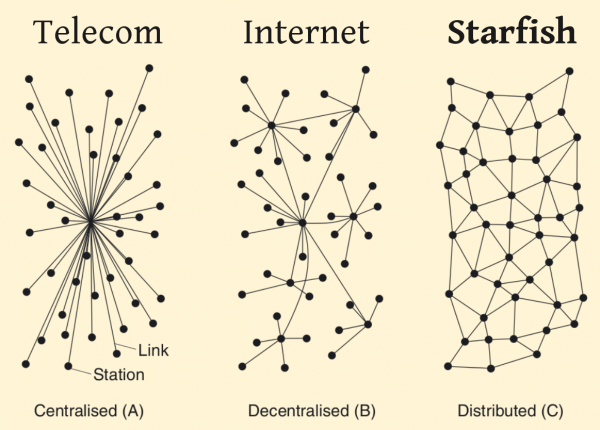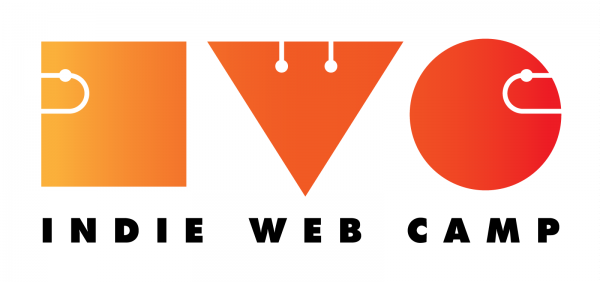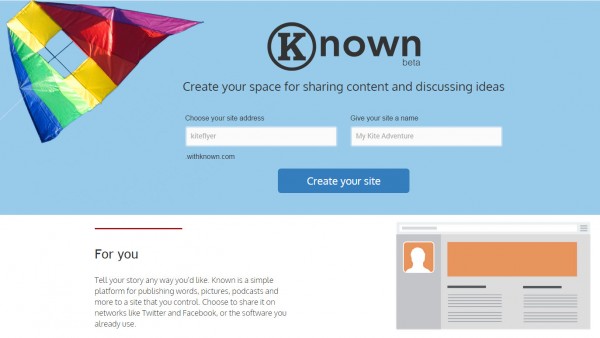I’ve recently learned about the Indie Web movement and I am very excited about it. It signals a move back to the origins of the Internet, which is based on decentralization and personal ownership of content.
Decentralization is important to the Internet because it helps keep any single entity from becoming too powerful. For example, Facebook wields a lot of power and control as it is the sole keeper of data for nearly a billion people. That’s a lot.
The Clever Developer site provides a great illustration that shows the difference between a centralized, distributed, and distributed network.
The same could be said for Google, Twitter, Instagram, and several other very large content aggregateors. That isn’t to say that these social networks don’t have value. They do and they provide a meaningful service. But as individuals we have to consider where our information is stored and managed, and whether we are in control of it.
Indie Web helps address that question. And is a step towards federated content.
What is Indie Web?
Indie Web is a recent technology trend that works to provide you applications and services to store, manage, and publish your own content. More in depth information can be found at Indie Web Camp and they have defined three high-level principles to fight back against “corporate web”.
- Your content is yours
- You are better connected
- You are in control
Those three principles are important because when you login to Facebook, Twitter, Instagram, YouTube and Pinterest, those principles do not apply.
Why is it important?
Moving away from corporate web allows you to operate in an Internet of Federated Content. This means that you create content (articles, photos, videos), publish the content online, and share it with other people without a middle-man service controlling that exchange.
Obviously there are advantages to corporate web social network services, otherwise they would not be as popular as they are. However, there are some downsides to using online social networks and many people believe they have not lived up to their promise of connecting people.
Why would it be better?
Federating your content through Indie Web platforms would provide you several features that the corporate web social networks simply are not going to provide you. Dan Gillmor provides an excellent example in his article, ‘Why the Indie Web movement is so important’, where he writes,
Suppose you could write in your personal blog and have a summary of your post show up on popular social-media sites like Twitter, LinkedIn, Google+ and Facebook – and then have responses on those sites show up as comments in your blog?
The idea as you can see is that you produce and curate your content on a site that you personally manage. A site that you have total control over and are not helpless against the whims of a corporate web service that decides to change it’s Privacy Policy to make more money.
In the near future we there will be applications and services that allow you to federate your content. For those early-adopters, you can likely start now as Gilmor writes,
…if some talented programmers have their way you’ll soon be able to do so easily. In fact, it’s what I’m doing right now with this post, which is also running at Slate Magazine.
How you can participate
If you find the Indie Web trend appealing, there is no better time than now to start. I highly recommend reading through the Indie Web Camp site. It is an Open-Source community and they would welcome all participants during their regular Indie Web related events.
Known
A new blogging platform to emerge into Beta is simply known as Known. It’s purpose is to help facilitate the Indie Web trend of federating your content.
POSSE
Another good source of information (also on the Indie Web Camp site) is POSSE, which is an acronym for Publish (on your) Own Site, Syndicate Elsewhere
Step in the Right Direction
I like this trend as it is a step in the right direction to putting ownership of content back into the hands of the people that created it in the first place. Why do I have to sign-in to Facebook to see someone’s photos or an article they wrote? Why can’t I go to THEIR site and see ALL of their content without a corporate constantly monetizing my behavior (and emotions).
There will be many great features and conveniences to come from the Indie Web trend, however I don’t know if the amount of critical mass that has built up in existing social networks can be swayed. At some point the Indie Web community will have to find a way to make services like Known cooler and more attractive than Facebook and YouTube.


